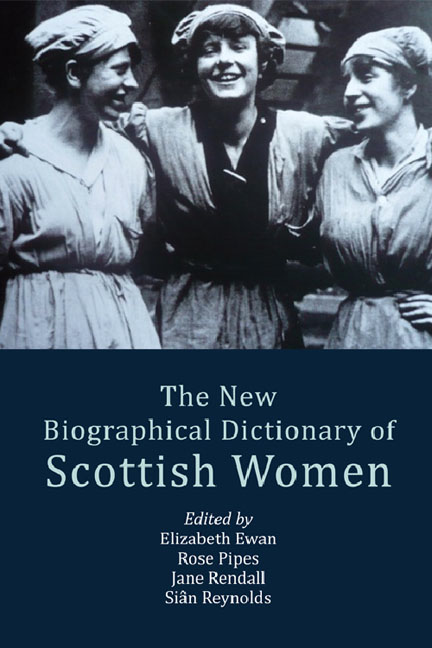Book contents
- Frontmatter
- Contents
- Acknowledgements The Biographical Dictionary of Scottish Women (2006)
- Acknowledgements The New Biographical Dictionary of Scottish Women (2018)
- Advisers to the Project (2006)
- Contributors
- Abbreviations
- Readers’ Guide
- New Entries
- Joint and Co-subjects
- Preface to The New Biographical Dictionary of Scottish Women
- Introduction to The Biographical Dictionary of Scottish Women (2006)
- The New Biographical Dictionary of Scottish Women
- Thematic Index
- Plate section
Introduction to The Biographical Dictionary of Scottish Women (2006)
Published online by Cambridge University Press: 23 November 2019
- Frontmatter
- Contents
- Acknowledgements The Biographical Dictionary of Scottish Women (2006)
- Acknowledgements The New Biographical Dictionary of Scottish Women (2018)
- Advisers to the Project (2006)
- Contributors
- Abbreviations
- Readers’ Guide
- New Entries
- Joint and Co-subjects
- Preface to The New Biographical Dictionary of Scottish Women
- Introduction to The Biographical Dictionary of Scottish Women (2006)
- The New Biographical Dictionary of Scottish Women
- Thematic Index
- Plate section
Summary
Why a biographical dictionary of Scottish women? It's a legitimate question, and it has several answers. The shortest one is that it aims to provide accurate, readable and stimulating information, not readily available anywhere else – despite the otherwise impressive amount of Scottish historical writing in recent years. But a dictionary with this title also makes larger claims. It should both contribute to ‘a statement of national identity’, and be ‘a stay against oblivion’, a memorial ‘designed to stir thoughts on fame and obscurity, on mortality and immortality’. It is the contention of the editors, shared we imagine by our contributors, that Scottish national identity has so far been largely construed in terms of the recorded achievements of men. Oblivion and obscurity was often the historical fate of women. There are various reasons why this was so in the past; at least part of the explanation was a lack of knowledge. But scholarship has moved on. Much more is now known about the women who have, in every thinkable way, contributed to the Scottish nation and its identity, and more than 1,000 of their names appear in the following pages.
The detailed thinking behind this dictionary is addressed at greater length in part II below. But readers consulting biographical dictionaries often prefer to skip the introduction and plunge straight in to the entries themselves. So we have started with an answer to the question every reader will probably want to ask (who's in, who's out?), by stating the criteria for inclusion and an explanation of nomenclature, before offering a more general essay, to which readers may return at leisure. See the Readers’ Guide above for quick reference.
Criteria for inclusion
No living persons have been included. This was the only non-negotiable criterion for selection. We have, though, included a few quasi-historical figures whose claim to have been ‘living’ at all could be questioned (see for example Braidefute, Marion). Secondly, while virtually all the entries are indeed on women, one or two subjects are strictly speaking ‘girls’ (see Fleming, Marjory), and there is at least one case of disputed sexual identity (see Barry, James).
- Type
- Chapter
- Information
- The New Biographical Dictionary of Scottish Women , pp. xxxviii - xlviPublisher: Edinburgh University PressPrint publication year: 2017



